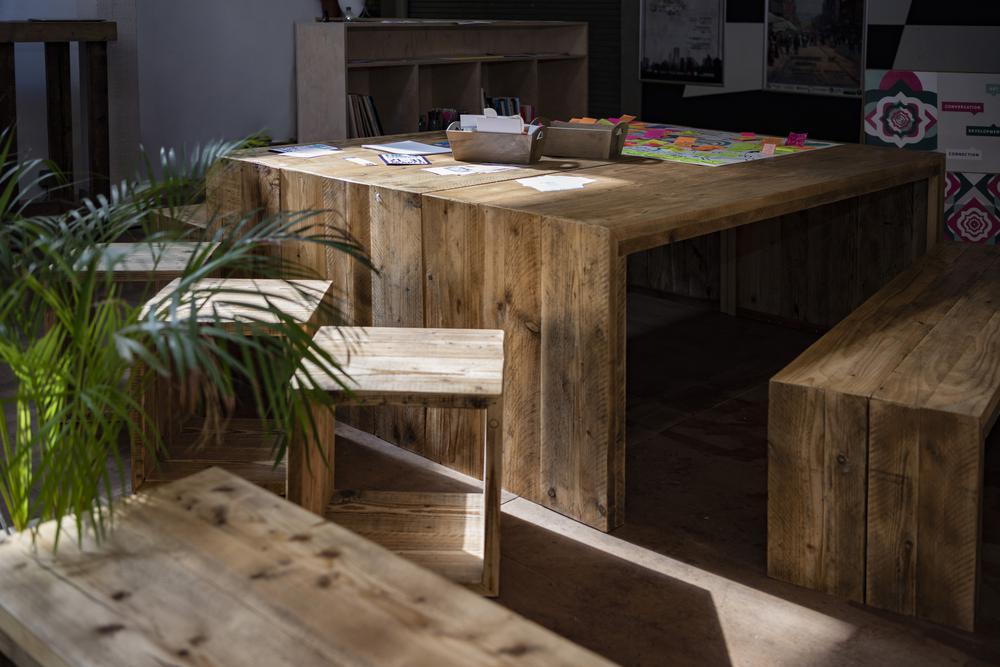Programless Spaces, further questions, Sarah Aziz, Neil McKenna
This is an email exchange of follow up questions and answers between Neil McKenna and Sarah Aziz after Sarah's presentation about programless spaces at the Future of West Yorkshire's Regional Democracy symposium that Same Skies organised in Huddersfield, 31 January 2020. The abstract of Sarah's talk is the below.
The image is by Laura Mateescu of the fantastic Parlour space in Huddersfield's Queensgate Market, set up and run by Parley.
Neil: My question is quite nuanced and I don't really have a full understanding as to why I am asking it, but it stems from an interest in your idea of discursive spaces.
I have come across the idea of 'urban labs' in recent years - as spaces in the city (town/village) that people can meet, hang out, use as spaces for discussion (probably both free and also programmed). I am also personally interested in combining them with art, workshop, and tinkering space.
I am interested in them as public spaces that don't have a financial barrier to entry - something that is quite rare beyond certain libraries, some museums, public spaces.
So my question is sort of three-fold:
1) Neil: In your view, where does the impetus for this come from? Should we be looking at community-groups, civil society buying space and setting up autonomously or should we be looking more at a state-led concerted effort to get these set up in different neighbourhoods? Or is it both??
Sarah: The most successful examples of 'urban labs' and alternative discursive spaces I've encountered have typically come into being through grassroots community organizations, who have identified moments of opportunities and redundancies in their environments and find ways to subvert them. A significant roadblock lies in attitudes towards code and zoning ordinances. When planning departments support programless spaces by changing zoning policies and instigating affordable rent/buying initiatives, such as the \$1 lot program in Chicago, it keeps agency in the hands of the community members. It ensures that these spaces can continue to evolve in a manner that's both responsive and meaningful for people who use them. Theaster Gates' work is a great example of this.
2) Neil: Related to the above, how are they normally organised and, importantly, financed? Is there a conflict between needing an income to function and being truly un-programmed, free spaces?
Sarah: One way is the adoption of a nonprofit model, as it protects the spaces and their respective identities. Another is to solicit donations and apply for grants; both options require a more formal infrastructure and the appointment of 'staff'. A more inclusive and cooperative approach, where everyone is given a stake and a sense of ownership, is a good way to establish and maintain these types of projects. There needs to be a common understanding that everyone is responsible for the maintenance of the space in one way or another. This relies heavily on mutual respect, which isn't always easy to garner. Assemble's work really speaks to this approach.
3) Neil: Given (particularly in UK) the issues of the declining high street, shopping moving to online rather than physical stores, what role might these sorts of spaces have in our high street? If they are not for profit ?), how does this relate to our conception of the high street as something for commerce, making money/profit, and the rent-seeking that accompanies this from landlords.
Sarah: If our perception of the high street shifts slightly to it being a place for belonging and cultivating community, I think that's ok. Peripatetic lifestyles, renting price-outs, and fluctuating home prices, make it challenging to establish deep and meaningful connections. We need more spaces that are free to use, with no underlying agenda, where people can congregate and simply be around each other. This exists to some degree with the flourishing 'coffee shop' culture found in the majority of cities and towns. They serve as a place where people can temporarily plug-in to some form of community.
Neil: Thanks very much Sarah for your responses.
I think I completely agree with the code/zoning issue. We don't use zoning in the UK but have a constraint applied to individual buildings through what we call 'use class' - once something is established as a house, or a retail shop for example, you need to justify changing it to something else. This has tended to be used in a very inflexible manner, failing to recognise that sometimes spaces are used for multiple purposes at different times in the day, over the week and throughout the year and so don't fall within one use class but potentially multiple. A post by my Director gives a little insight into this.
The formation of co-operatives to run collective spaces seems to work quite well, where people need to purchase membership to attend events and then members of public can get involved in the running of the space (finance, events, sound and equipment etc.) I think there will always be a tension between being 'program-less' versus needing to try and raise money to cover building and staff/volunteer costs and think about what might get people through the door - particularly in a city where there are a lot of options and competing things for people to do. The spaces that spring to my mind are DIY Space in London which is really good in terms of socialising and opening up different work groups to run the space and then, closer to home for me, Wharf Chambers in Leeds.
I am also totally in favour of the high street being focused more on belonging and community. I really like the idea of the extension of the living room in the public sphere, providing spaces that are open late for music and art, tools and workshops, making food etc. that don't revolve around alcohol/partying but are more relaxed. Perhaps they wouldn't overcome segregation in the city, but from my experience (in London mostly) we are very bad at providing truly diverse and inclusive spaces for people of different cultures and backgrounds to come together. We can fool ourselves into thinking we are integrating in diverse neighbourhoods when you walk on the public street but then you look around in the more private spaces of cafes, bars, pubs and restaurants and that diversity doesn't get reflected inside.
The West Yorkshire Alterity: A Call for More Discursive Spaces
Sarah Aziz
In much of West Yorkshire, the effects of racial and economic segregation are palpable, and we must create spaces that engender a transgressive and ambiguous character to allow new, meaningful forms of interaction and discourse to transpire. When we have places to engage in dialogues with people from radically different backgrounds than our own, a diversity of perspectives is reached, as we engage in first-hand learning and listening and cultivate new forms of community. Although there are a plethora of social spaces in the region, they’re often tied to the exchange of money for goods, such as pubs and restaurants, or their use is contingent upon good weather, such as parks and promenades. We need spaces that are programless and accessible to everyone, regardless of their age, beliefs, background, and place on the socioeconomic spectrum. These inclusive spaces where personal narratives, concerns, and ideas can be shared and unpacked, will create a region that is safer, as we develop a deeper sense of empathy for our fellow citizens, and more progressive, as collaboration and innovation across cultures will be fostered.
Another critical issue that this approach addresses is mental health. To create more accessible and inclusive spaces where no particular mode of being is prescribed, we begin to combat feelings of social and cultural isolation, as we have places to frequent that we have a stake and sense of ownership in. These discursive spaces should exist in underutilized buildings that the government subsidizes, and their repurposing should be collective and achieved democratically. The negotiations and exchanges required to develop these "other" spaces will allow people to glean insights into other ways of seeing and making, and empower them to take control over their urban environments. The open design processes will also provide skills to people of all ages and abilities, creating a more vibrant and responsive region.
What could devolution mean for asylum seekers in Yorkshire?
by Ian Martin @ianeastleeds
What would happen if Yorkshire could decide for itself how to welcome those fleeing war and persecution? If you want to …
Why should we in the North continue to place hope and faith in a national elite?
"Why not get together to decide what we want and demand the authority - and responsibility - needed to make it happen?"
Andrew Wilson of the Same …
Preview Screening: Three Short Films About Inspirational West Yorkshire People and Organisations
Please join us for a preview screening of three Same Skies short films about inspirational West Yorkshire people and organisations.
The story of Frontline Self …

